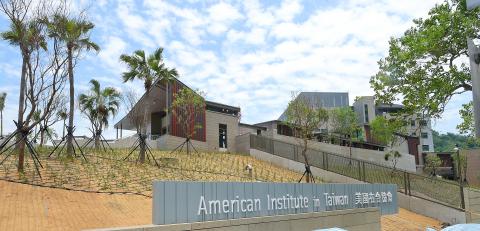Security arrangements at the new American Institute in Taiwan (AIT) compound will be the same as at its current location, a spokesperson for the US Department of State said on Thursday.
Since the de facto US embassy inaugurated its new building complex in Taipei’s Neihu District (內湖) on June 12, there have been news reports that US Marines could be deployed at the facility, in accordance with standard US practice at its embassies around the world.
In the wake of reports that the US Department of State asked the Pentagon to deploy a detachment of US Marines to Taiwan to help provide security at the AIT, CNN on Thursday cited US officials as saying that the request had been rejected due to resource constraint issues and not out of fear of irritating Beijing.

Photo: Chang Chia-ming, Taipei Times
The decision was made by US Secretary of Defense James Mattis last month, CNN reported, citing one defense official, who said that before the request was rejected, military planners had anticipated the US Marines would arrive in Taiwan as early as next month.
Asked about the report, the US Department of State said in a statement e-mailed to the media: “As is the practice at AIT’s current location, a small number of American personnel detailed to AIT along with a larger number of locally-hired employees will provide security for the new office building in cooperation with local authorities.”
The AIT has yet to move to the compound from its current address in Taipei’s Xinyi District (信義).
“We do not discuss specific security matters concerning the protection of our facility or personnel,” the statement said, reiterating the US’ commitment to its “one China” policy, based on the three US-China joint communiques and the Taiwan Relations Act.
Pentagon spokesman Lieutenant Colonel Christopher Logan declined to comment on the matter, saying: “We do not discuss the operational details or the internal deliberations related to specific security matters concerning the protection of our facilities or personnel.”

NATIONAL SECURITY THREAT: An official said that Guan Guan’s comments had gone beyond the threshold of free speech, as she advocated for the destruction of the ROC China-born media influencer Guan Guan’s (關關) residency permit has been revoked for repeatedly posting pro-China content that threatens national security, the National Immigration Agency said yesterday. Guan Guan has said many controversial things in her videos posted to Douyin (抖音), including “the red flag will soon be painted all over Taiwan” and “Taiwan is an inseparable part of China,” while expressing hope for expedited “reunification.” The agency received multiple reports alleging that Guan Guan had advocated for armed reunification last year. After investigating, the agency last month issued a notice requiring her to appear and account for her actions. Guan Guan appeared as required,

A strong cold air mass is expected to arrive tonight, bringing a change in weather and a drop in temperature, the Central Weather Administration (CWA) said. The coldest time would be early on Thursday morning, with temperatures in some areas dipping as low as 8°C, it said. Daytime highs yesterday were 22°C to 24°C in northern and eastern Taiwan, and about 25°C to 28°C in the central and southern regions, it said. However, nighttime lows would dip to about 15°C to 16°C in central and northern Taiwan as well as the northeast, and 17°C to 19°C elsewhere, it said. Tropical Storm Nokaen, currently

PAPERS, PLEASE: The gang exploited the high value of the passports, selling them at inflated prices to Chinese buyers, who would treat them as ‘invisibility cloaks’ The Yilan District Court has handed four members of a syndicate prison terms ranging from one year and two months to two years and two months for their involvement in a scheme to purchase Taiwanese passports and resell them abroad at a massive markup. A Chinese human smuggling syndicate purchased Taiwanese passports through local criminal networks, exploiting the passports’ visa-free travel privileges to turn a profit of more than 20 times the original price, the court said. Such criminal organizations enable people to impersonate Taiwanese when entering and exiting Taiwan and other countries, undermining social order and the credibility of the nation’s

‘SALAMI-SLICING’: Beijing’s ‘gray zone’ tactics around the Pratas Islands have been slowly intensifying, with the PLA testing Taiwan’s responses and limits, an expert said The Ministry of National Defense yesterday condemned an intrusion by a Chinese drone into the airspace of the Pratas Islands (Dongsha Islands, 東沙群島) as a serious disruption of regional peace. The ministry said it detected the Chinese surveillance and reconnaissance drone entering the southwestern parts of Taiwan’s air defense identification zone early yesterday, and it approached the Pratas Islands at 5:41am. The ministry said it immediately notified the garrison stationed in the area to enhance aerial surveillance and alert levels, and the drone was detected in the islands’ territorial airspace at 5:44am, maintaining an altitude outside the effective range of air-defense weaponry. Following